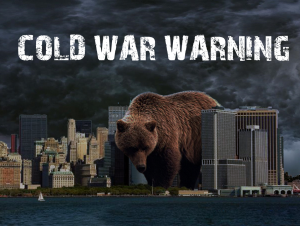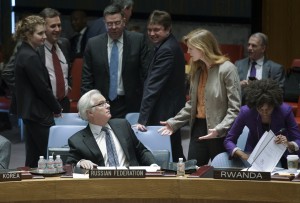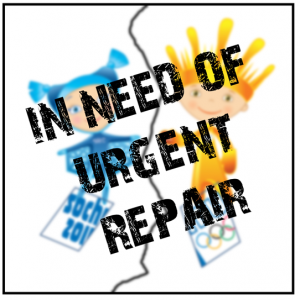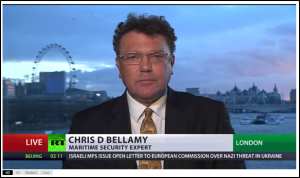 The war of words continues as Russia is finding itself increasingly isolated by the NATO Alliance and is already seeking stronger ties with leaders of the BRIC nations where it may feel it gets fairer hearing over its annexation of Crimea.
The war of words continues as Russia is finding itself increasingly isolated by the NATO Alliance and is already seeking stronger ties with leaders of the BRIC nations where it may feel it gets fairer hearing over its annexation of Crimea.
Certainly monitoring the news reports here in the UK you’re left with a distinct impression that the Cold War and the imminent isolation of Russia is just around the corner. Russia may have got what it wanted but it’s losing the PR war.
A good example of what I mean is illustrated by the attack Russia faced at the UN Security Council on Wednesday 19 March when US Ambassador Samantha Powers called the Great Bear a “thief”. Not the sort of diplomatic language that’s usually heard in the UN and of course intended to convey a level of anger and hostility not seen since the days of the Cold War.
 Ambassador Powers said “a thief can steal property but that doesn’t confer the right of ownership on the thief” and waved her finger at Moscow warning that Washington and its allies will impose increasingly punitive sanctions on the Kremlin if it doesn’t reverse the course of events in Ukraine. By all accounts since she made that threat, it looks unlikely her wish looks like being granted.
Ambassador Powers said “a thief can steal property but that doesn’t confer the right of ownership on the thief” and waved her finger at Moscow warning that Washington and its allies will impose increasingly punitive sanctions on the Kremlin if it doesn’t reverse the course of events in Ukraine. By all accounts since she made that threat, it looks unlikely her wish looks like being granted.
She also denounced Russia’s actions in Crimea as “aggression” and “provocations” and added that “what happened in Crimea can’t be repeated in other parts of the Ukraine” referring to the referendum in Crimea where nearly 87% of residents of the Black Sea peninsular voted to return to Russia.
The referendum, observed by more than a hundred bona fide international observers from 23 countries – although not affiliated with the Organisation for Security and Cooperation in Europe – has triggered a major crisis in East/West public relations not witnessed since the Cold War.
Given that athletes from around the world have just celebrated an enormously successful Winter Olympic and Paralympic Games in Sochi just a few weeks’ ago, the values of the Olympic Movement and its message of goodwill appears to have been obliterated by recent events.
 Whatever PR advantage Russia may have hoped to secure with hosting the Olympics looks as if it’s been reversed by the daily turn of events in Ukraine, possibly making Sochi 2014 one of the less successful Olympic Games in history from a PR perspective of the host nation.
Whatever PR advantage Russia may have hoped to secure with hosting the Olympics looks as if it’s been reversed by the daily turn of events in Ukraine, possibly making Sochi 2014 one of the less successful Olympic Games in history from a PR perspective of the host nation.
Of course it’s easy to dismiss President Putin as conducting ‘gun boat’ diplomacy when he addressed the Russian Parliament in the wake of the result of the referendum in what many commentators saw as one of the defining moments of his presidency.
What’s not so clear was when the Ukrainian officer who was shot dead three and a half hours later was done on the orders of the Russian army as had been claimed by the media reports here in the West.
 According to Professor Chris Bellamy, one of the world’s leading experts on Russian and Soviet military affairs and an acclaimed Russian historian, who was also Defence Correspondent of The Independent, the reporting of events unfolding in the Ukraine are signs that there’s a ‘phoney war’ being fought in the media.
According to Professor Chris Bellamy, one of the world’s leading experts on Russian and Soviet military affairs and an acclaimed Russian historian, who was also Defence Correspondent of The Independent, the reporting of events unfolding in the Ukraine are signs that there’s a ‘phoney war’ being fought in the media.
“When I reviewed what the Russian media were reporting about the shooting of a Ukrainian officer it started to become very clear that there are two sides to this news story.
“One was the accusation by the Ukrainian Prime Minister claiming that pro-Russian people’s self-defence army of Crimea had started shooting at Ukrainian servicemen in an unprovoked attack and were guilty of war crimes. And the other story is that in fact there was a message received by both Ukrainians and Russians about a disturbance outside the barracks and in fact what was at that time an unidentified sniper that shot dead the soldier. Since the incident happened, reliable information has been received from the Russian media that this was an ultra-nationalist Ukrainian sniper.
“Obviously I wasn’t there and therefore can’t comment on this but whatever happened, it triggered the situation where the West condemned Russia as an aggressor. Conflating this with Russia’s ratification of the referendum makes a better news story. But is it true? Clearly there’s a media war going on here.”
Interestingly, the UN Russian Ambassador Vitaly Churkin observed that US Ambassador Power’s comments had “dropped to the level of the tabloid press” and that “it’s simply unacceptable to listen to these insults addressed to our country.”
The war of words is set to continue but it’s unclear who will emerge the victor in this mother of PR battles.
It’s going to be fascinating to watch how the political leaders in the East and West will try to work out a compromise that achieves a delicate balance of respecting the right of self-determination balanced against the West’s increasing concerns about Russian expansionist ambitions – perceived or otherwise – in the region.
Ardi Kolah is the former Director of Marketing & Communications at the Defence Academy of the United Kingdom and the author of Essential Law for Marketers, published by Kogan Page and continues to work closely with Professor Chris Bellamy.














Recent Comments